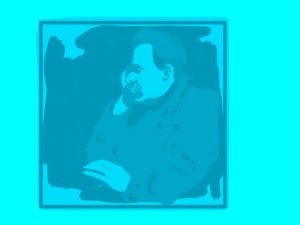By Annelies Schulte Nordholt
Most of Blanchot’s work was written in a critical dialogue with a number of modern and contemporary writers and thinkers but, rather than a critic, he is an autonomous author with a questioning and method entirely his own. That is why, in this talk, I will not act as a historian of philosophy, trying to point out how Nietzsche may have influenced or inspired him. A much more interesting question is how Blanchot resonates with certain intuitions of Nietzsche’s and how they inform his thought. I will start by briefly formulating two of these crossing points. The first one is what we could call the revelation of Nihilism. I will show how this experience of a collapse of all meaning is present very early on in his fictional work. The second crossing point is Blanchot’s intuition that his questioning on what’s a stake in literature may only be pursued through the medium of writing. That is why his work goes beyond the limits of literary genres, belonging both to literature and to philosophical thought – another common point with Nietzsche.
In order to develop these two points, I will first give a general outline of Blanchot’s questioning of literature and then focus on one single question: Blanchot’s conception of the specific temporality of writing in relation to Nietzsche’s Eternal Return. In the outline I will focus on The Infinite Conversation, showing how Blanchot’s questioning is expressed in the paratexts of this work: its epigraphs and its introductory Note. Studying the epigraphs, we will see how The infinite Conversation is encircled by a Mallarmé and a Nietzsche quote and what this implies. We will then try and understand the radicalism of Blanchot’s questioning on literature: why is ‘writing’ an intransitive verb in his eyes? And what does it mean that writing is a “force of absence” putting at stake all the assumptions of western metaphysics: God, the Self, Truth, the One and even the Book itself? How does it point at the other of discourse, of truth but also of ordinary, linear time?
Blanchot’s intuition of a temporality turning inside out the ordinary time will lead us to his profound resonance with Nietzsche and his notion of Eternal Return, especially in ‘Reflexions on Nihilism’, § 2, ‘Crossing the line’, in The Infinite Conversation. What is Eternal Return? Is it the depressing thought of the eternal circularity of time? Or should it be celebrated, as Nietzsche does, as eternal change and self-affirmation, as the core of life itself? Or, in yet another way, is it the incessant repetition of everything and its shifting into difference – a movement that Blanchot sees at work in the experience of writing?
Please read beforehand, in The Infinite Conversation:
- the epigraphs
- the Note (p. XI-XII)
- Reflexions on Nihilism, especially § 2: Crossing the line (pp. 143-151)
- On a change of Epoch: The Exigency of Return (pp. 264- 281).

